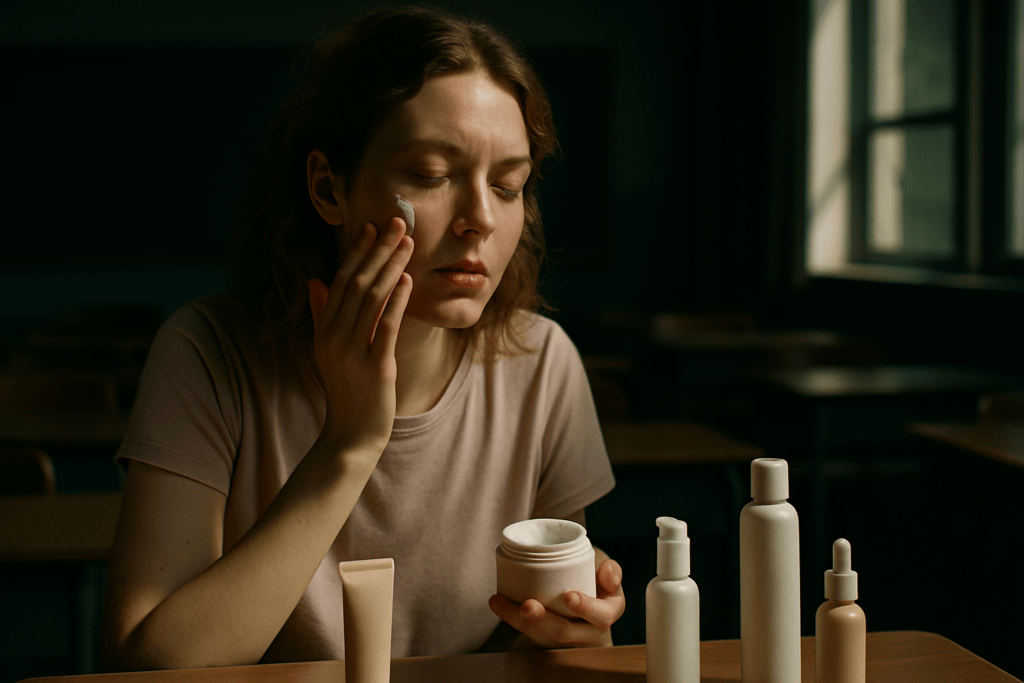Understanding Your Skin Type
Identifying your skin type is pivotal for an effective skincare routine. The four main skin types are oily, dry, combination, and sensitive.
Oily Skin
Oily skin produces excess sebum, leading to shine and enlarged pores. Acne breakouts are common. Use non-comedogenic products to avoid clogged pores.
Dry Skin
Dry skin lacks moisture, resulting in flakiness and tightness. It is prone to irritation. Hydrate with emollient-rich moisturizers, and avoid harsh cleansers to maintain the skin barrier.
Combination Skin
Combination skin features both oily and dry areas. Typically, the T-zone (forehead, nose, and chin) is oily, while the cheeks are dry. Balance the skin with products targeted for each area.
Sensitive Skin
Sensitive skin reacts easily to products and environmental factors. Symptoms include redness, itching, and burning. Opt for fragrance-free, hypoallergenic products to reduce the risk of irritation.
Recognizing your skin type ensures tailored skincare, improving results and maintaining skin health.
Daily Skincare Routine Recommendations

Dermatologists agree that a consistent daily routine keeps skin healthy and radiant. Key steps include cleansing, toning, moisturizing, and sun protection. Below are detailed insights into each step.
Cleansing
Start with a gentle cleanser to remove dirt, oil, and impurities. Use lukewarm water to avoid stripping the skin of natural oils. For oily skin, use a foaming or salicylic acid-based cleanser. Dry skin can benefit from a hydrating cleanser with ingredients like glycerin. For sensitive skin, choose a fragrance-free cleanser, while combination skin can use a gel cleanser that balances hydration and oil control.
Toning
Apply a toner to help balance the skin’s pH and prepare it for moisturizer. Use alcohol-free toners to avoid drying out the skin. Oily skin benefits from toners containing witch hazel or salicylic acid. For dry skin, look for hydrating toners with hyaluronic acid. Sensitive skin toners should include soothing ingredients like aloe vera. Combination skin can use toners with a mix of balancing and hydrating elements.
Moisturizing
Always follow up with a moisturizer to hydrate and protect the skin’s barrier. Opt for non-comedogenic options to avoid clogging pores. Oily skin needs a lightweight, oil-free moisturizer. For dry skin, use a thick, emollient-rich moisturizer with ingredients like shea butter. Sensitive skin requires hypoallergenic moisturizers with minimal ingredients. Combination skin benefits from using different moisturizers in specific areas, such as a light gel for oily zones and a richer cream for dry areas.
Sun Protection
Finish with sunscreen to shield the skin from harmful UV rays, preventing premature aging and skin cancer. Choose a broad-spectrum sunscreen with SPF 30 or higher. Oily skin can benefit from a mattifying sunscreen, while dry skin needs a hydrating sunscreen with added moisturizers. For sensitive skin, use mineral sunscreens with zinc oxide or titanium dioxide. Combination skin should use non-comedogenic formulations to avoid clogging pores while ensuring protection.
By adhering to these dermatologist-recommended steps, one can maintain healthy, glowing skin every day.
Advanced Skincare Treatments
Dermatologists often recommend advanced treatments to address specific skin concerns. These treatments can significantly enhance skin texture and appearance.
Chemical Peels
Chemical peels use acid solutions to remove dead skin cells. They treat various issues such as:
- acne
- hyperpigmentation
- wrinkles.
Dermatologists typically determine the peel strength based on skin sensitivity and desired outcomes. For example, alpha-hydroxy acids (AHAs) are milder and suitable for surface exfoliation, while trichloroacetic acid (TCA) peels penetrate deeper for more dramatic results.
Microneedling
Microneedling involves creating tiny punctures in the skin with fine needles, promoting collagen production. This treatment addresses scars, fine lines, and enlarged pores. Dermatologists use a device called a dermaroller or a derma pen for controlled precision. The procedure helps boost collagen levels, tightening skin and reducing blemishes. Typically, patients need multiple sessions for optimal results.
Laser Therapy
Laser therapy targets various skin issues, including sun damage, scars, and vascular lesions. It utilizes focused light to remove damaged skin layers or stimulate collagen growth. Fractional lasers are popular for resurfacing and treating fine lines, while pulsed dye lasers are effective for redness and broken capillaries. Dermatologists customize laser treatments based on skin type and specific concerns, ensuring maximum efficacy with minimal downtime.
Advanced skincare treatments like these offer effective solutions for achieving clear, radiant skin.
Nutrition and Lifestyle Tips
Dermatologists often stress the importance of nutrition and lifestyle for maintaining healthy skin. Below are key tips focusing on diet, hydration, and sleep for optimizing skincare.
Diet for Healthy Skin
A diet rich in antioxidants, healthy fats, and vitamins greatly impacts the skin’s health. I find that consuming foods like berries, leafy greens, nuts, and fatty fish helps reduce inflammation and combat oxidative stress. These foods contain vital nutrients, including Vitamin C, Vitamin E, and omega-3 fatty acids, which support skin repair and rejuvenation. Including whole grains, lean proteins, and avoiding excessive sugar intake also contributes to clearer, more radiant skin.
Importance of Hydration
Staying hydrated is crucial for skin health. Drinking about 8 cups (64 ounces) of water daily aids in maintaining the skin’s elasticity and preventing dryness. When I drink sufficient water, my skin looks plumper and more youthful. Additionally, consuming hydrating foods like cucumbers, watermelon, and oranges can enhance overall hydration. Proper hydration also supports the skin’s natural detoxification processes, aiding in the removal of toxins.
Sleep and Skin Health
Adequate sleep is vital for skin rejuvenation. Dermatologists recommend 7-9 hours of sleep per night to allow the skin to repair itself. During sleep, the body increases blood flow to the skin, which helps in cell regeneration and repair of damaged tissues. I’ve noticed that a good night’s sleep reduces the appearance of dark circles and puffiness around my eyes. Incorporating a nighttime skincare routine and ensuring a restful sleep environment can significantly improve skin’s overall appearance and health.
Common Skincare Myths Debunked
- Myth 1: Expensive Products Are Always Better
High price tags don’t guarantee superior effectiveness in skincare products. Many affordable brands offer high-quality ingredients and efficacy. Dermatologists often recommend looking at active ingredients, not brand labels, to determine a product’s worth. - Myth 2: Natural Ingredients Are Always Safe
Plant-based ingredients can still cause allergic reactions or irritation. Natural doesn’t automatically mean gentle. Dermatologists recommend patch-testing new products, even those labeled natural, to avoid adverse reactions. - Myth 3: Oily Skin Doesn’t Need Moisturizer
Skipping moisturizer can lead to increased oil production as the skin tries to compensate for dryness. Dermatologists advise using a lightweight, non-comedogenic moisturizer to maintain balanced hydration for oily skin. - Myth 4: Drinking Water Hydrates the Skin
While hydration is vital for overall health, drinking water alone doesn’t directly hydrate the skin. Skin hydration requires topical moisturizers. Dermatologists emphasize the use of humectants like hyaluronic acid to retain moisture in the skin. - Myth 5: Tanning Beds Are Safe for Skin
Tanning beds emit harmful UV radiation, increasing the risk of skin cancer and premature aging. Dermatologists strongly advise against using tanning beds, advocating for safer alternatives like self-tanning products. - Myth 6: Pores Can Open and Close
Pores lack muscles and can’t open or close. They may appear larger due to clogging or excess oil. Dermatologists recommend exfoliation and the use of products with ingredients like salicylic acid to keep pores clean and minimize their appearance.


 Creative Director at Divine Glamour Trail, is the visionary behind the platform, which is dedicated to bringing readers the latest trends in hairstyles, beauty, and skincare. With a passion for timeless fashion and expert style guidance, George provides tips, secrets, and updates that empower individuals to enhance their personal style. His platform is a go-to source for anyone looking to stay ahead in the fashion game, combining modern trends with timeless elegance to help readers feel confident and look their best.
Creative Director at Divine Glamour Trail, is the visionary behind the platform, which is dedicated to bringing readers the latest trends in hairstyles, beauty, and skincare. With a passion for timeless fashion and expert style guidance, George provides tips, secrets, and updates that empower individuals to enhance their personal style. His platform is a go-to source for anyone looking to stay ahead in the fashion game, combining modern trends with timeless elegance to help readers feel confident and look their best.
